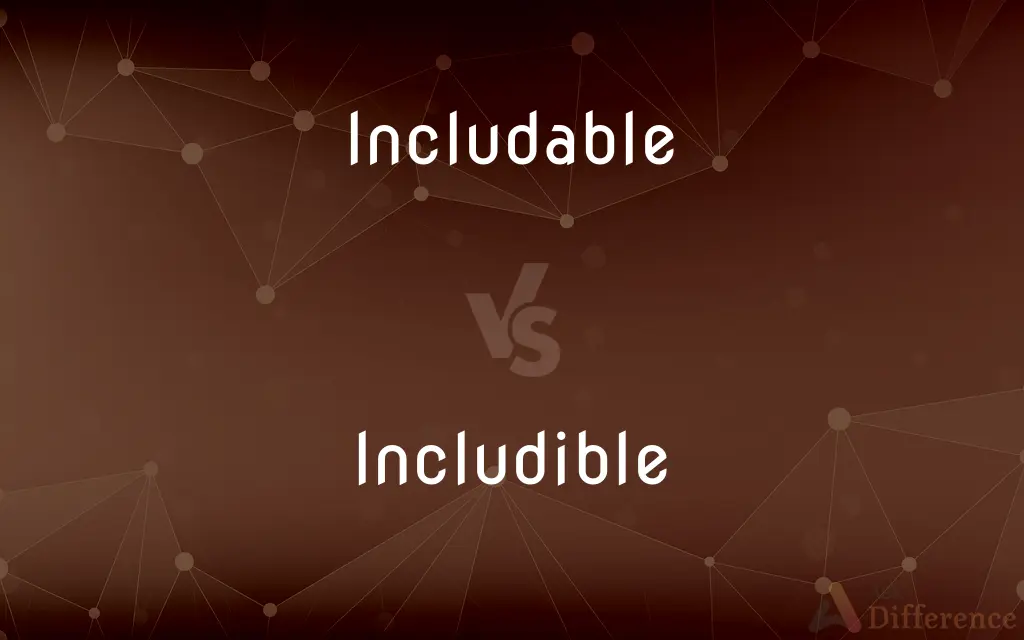Includable vs. Includible — What's the Difference?
By Tayyaba Rehman & Maham Liaqat — Updated on March 26, 2024
Includable and includible both refer to the capability of being included, but their usage contexts differ slightly.

Difference Between Includable and Includible
Table of Contents
ADVERTISEMENT
Key Differences
Includable is often used in general contexts to describe something that can be included within a larger entity or group. Whereas includible tends to be used in more specific, often legal or technical, contexts to denote something that meets the criteria to be included, especially in documents or lists.
Both terms imply that the item in question can be part of something else, whether due to relevance, suitability, or compliance with certain criteria.
However, includable is more commonly found in everyday language, covering a broad range of inclusion possibilities. On the other hand, includible, while also denoting the ability to be included, often carries a nuance of fulfilling specific requirements or standards, making it a preferred term in formal, regulatory, or technical discussions.
For instance, in tax law, income may be described as includible in gross income if it meets certain legal criteria. In contrast, includable is more likely to appear in less formal or less specialized discussions, indicating a more general sense of potential inclusion without the emphasis on meeting specified criteria.
Comparison Chart
Definition
Capable of being included
Capable of being included
ADVERTISEMENT
Usage Context
General, broader contexts
Specific, often legal or technical
Commonality
More common in everyday language
More common in formal contexts
Nuance
Broad inclusion possibilities
Inclusion based on criteria
Example Usage
"This appendix is includable in the report."
"Certain expenses are includible for tax deductions."
Compare with Definitions
Includable
Capable of being added or incorporated within something else.
The additional chapter is includable in the final manuscript.
Includible
Meeting the necessary criteria to be included, especially in formal or legal contexts.
Interest income is includible on your tax return.
Includable
Suitable or eligible for inclusion.
All team members are includable in the group photo.
Includible
Qualifying for inclusion based on specific standards or regulations.
Only certified expenses are includible under the policy.
Includable
Permissible to be considered as part of an aggregate or whole.
Supplementary materials are includable in the submission.
Includible
Eligible to be added to a list or document due to compliance with certain rules.
Deductible contributions are includible in the annual report.
Includable
Fit to be enclosed within a particular space or context.
These topics are includable in the discussion agenda.
Includible
Appropriate for incorporation into a particular category or classification.
Donations are includible as charitable contributions.
Includable
Having the potential to be part of a larger group or set.
Bonus points are includable in the total score.
Includible
Able to be considered part of a total or aggregate for official purposes.
Reimbursed amounts are includible in taxable income calculations.
Includable
To contain or take in as a part, element, or member.
Includible
To contain or take in as a part, element, or member.
Includable
To consider as part of or allow into a group or class
Thanked the host for including us.
Includible
To consider as part of or allow into a group or class
Thanked the host for including us.
Includable
Alternative form of includible
Includible
Suitable or available for inclusion.
Includable
One who or that which is eligible to be included.
Includible
Capable of being included.
Common Curiosities
Why is includible used more in legal or technical documents?
Because it conveys the idea of meeting specific standards or criteria, which is often a concern in legal or technical contexts.
Can something be includible but not includable?
Theoretically, due to the nuanced difference, something could be "includible" in a technical sense but not commonly referred to as "includable" in everyday language. However, this distinction is very subtle and rarely encountered.
How does context affect the choice between includable and includible?
The choice often depends on the formality of the context and whether specific criteria for inclusion are being considered.
Are includable and includible interchangeable?
While often used interchangeably, includible is preferred in formal contexts, especially where specific criteria for inclusion are implied.
Are there any contexts where only one of the terms would be appropriate?
In legal documents or technical specifications, "includible" is often more appropriate due to its implication of meeting specific criteria.
Can the use of includable vs. includible affect legal interpretations?
Potentially, yes. In legal contexts, the choice of words can impact the interpretation of a document, making the precise use of language crucial.
Are there any famous legal cases where the distinction between includable and includible was significant?
Specific cases might not highlight this distinction explicitly, but the accurate use of terminology is crucial in legal arguments and documentations.
Is one term more correct than the other?
Neither is more correct; their usage depends on context and preference.
How do non-native English speakers deal with the subtleties between includable and includible?
It requires learning the context in which each term is typically used, much like other nuances in English.
Do includable and includible have different origins?
Both share the same linguistic root related to the concept of inclusion, with their slight difference more a matter of usage than origin.
Can the usage of includable vs. includible change the meaning of a sentence?
Yes, the choice between them can subtly change the emphasis of a sentence, with "includible" suggesting a more formal or criteria-based inclusion.
How should one decide which term to use in writing?
Consider the audience and context: use "includible" for formal, legal, or technical documents and "includable" for more general contexts.
Is there a trend in the usage of includable vs. includible over time?
Trends in usage may shift based on evolving language practices, though both terms remain relevant in their respective contexts.
How do digital word processors handle the spelling of includable and includible?
Most word processors recognize both as correct, though suggestions may vary based on the dictionary settings.
Is there any guidance from style guides on when to use includable vs. includible?
Some style guides might offer recommendations based on formality and context, emphasizing clarity and precision in language use.
Share Your Discovery

Previous Comparison
Backshore vs. Foreshore
Next Comparison
Poster vs. InfographicAuthor Spotlight
Written by
Tayyaba RehmanTayyaba Rehman is a distinguished writer, currently serving as a primary contributor to askdifference.com. As a researcher in semantics and etymology, Tayyaba's passion for the complexity of languages and their distinctions has found a perfect home on the platform. Tayyaba delves into the intricacies of language, distinguishing between commonly confused words and phrases, thereby providing clarity for readers worldwide.
Co-written by
Maham Liaqat













































